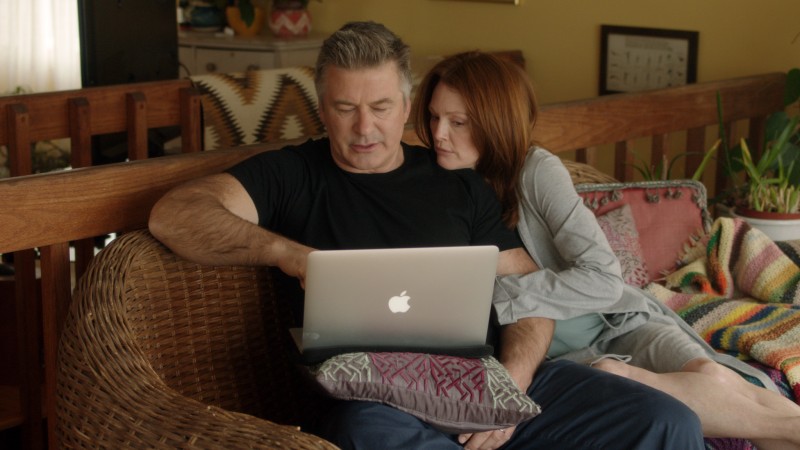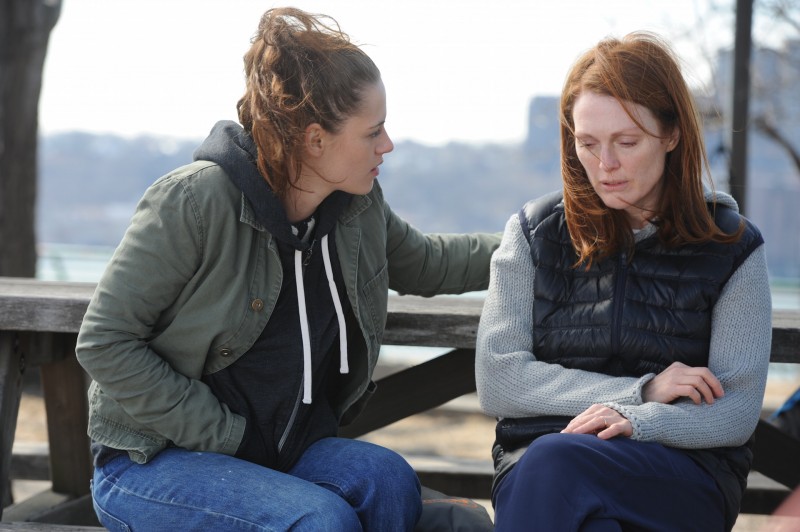Still Alice: Review
"A deeply emotional and contemplative reflection of someone living with Alzheimer's"
An emotional punch in the gut,
Still Alice shines a spotlight on the usually subordinate topic of Alzheimer's Disease. Co-directed by Richard Glatzer, who is himself grappling with a debilitating disease (ALS),
Still Alice captures the brutal agony that surrounds the diagnosis and progression of a terminal, incurable illness. Challenging their audience to see Alzheimer's patients not as pitiable victims of cruel fate, but as dignified, emotional human beings, Richard Glatzer and Wash Westmoreland humanize the faces of those with a dehumanizing disease.

Based on a book of the same name by Lisa Genova,
Still Alice centers around Dr. Alice Howland (
Julianne Moore), a well-regarded lecturer and professor of linguistics at Colombia University. Words begin to drop out of her usually eloquent vocabulary, lectures begin to fall flat, and the startling revelation that she has become lost on her own campus allude to a much more severe problem than “getting older” or menopause. Visiting a neurologist, Alice is scanned for brain cancer and given several memory tests. Upon a follow up visit, Alice discovers that while she has escaped the fate of brain cancer, she is showing signs of Familial Early-Onset Alzheimer's. Devastated, and unable to keep her secret any longer, Alice informs her husband, John (Alec Baldwin) of her prognosis. Alice and John meet with the neurologist to go over her diagnosis, finding that their worst fears have been realized. Alice has Early-Onset Alzheimer's, and it is likely that she has passed it on genetically. In one of the more harrowing scenes in the film, Alice and John must deliver the grave news to their three children: Anna (Kate Bosworth), who is currently trying to conceive; Tom (Hunter Parrish), a medical school student in his residency; and Lydia (Kristen Stewart) the aspiring stage actor. Shouldered with the burden of a terminal illness, Alice's pain and disgrace when telling her children that they have a 50% chance of the same fate is purely heartbreaking.

Directing via the text-to-speech function on an iPad, Richard Glatzer centers his story around Alice, and not her family or their perceptions of the disease. The narrative comes straight from the person experiencing Alzheimer's, making her troubles more communicable and empathetic. We see how Alzheimer's affects Alice's family, but only when they are around Alice; and often in a whispered hush as to not upset or offend our lead character. Glatzer positions his film so that the disease is presented on the patient's terms, as only someone experiencing an equal affection could possibly achieve. In the early stages of her post-diagnosis, Alice speaks at a national conference about her illness. In her speech, Alice remarks, “I'm still alive. I know I'm alive. I have people I love dearly. I have things I want to do with my life. I rail against myself for not being able to remember things - but I still have moments in the day of pure happiness and joy.” This sentiment is the crux of Glatzer's film, no matter the severity of the illness, the disease is not what defines someone – we define ourselves, no matter the condition.
In order to fully immerse his audience in the narrative, Glatzer staggers the timeline of his film to match Alice's assumed perception of time. As more of her memory is destroyed, the film takes leaps forward with each cut, jarring its audience into an unknown future. In a scene concluded like an episode of
The Twilight Zone, Alice becomes annoyed that her phone is missing. Going on a desperate, and increasingly flustered hunt, she dismantles her kitchen until John calms her enough to take her back to bed. Cut to morning, and a visit from Anna, who brings lunch. Digging for plates, John finds Alice's phone, and returns it with a side note to Anna, “that was a month ago.” In that moment, hokey as the editing trick may be, it is instantly clear how far Anna's disease has progressed, and that we, as members of the audience, will be experiencing this decline in unison.

In her role as Alice, Julianne Moore is incredible. Filled with emotion, the utter despair and forced-positivity are plainly evident in her performance. Shot in 23 days, and out of chronological order, Moore's ability to pinpoint a stage of Alzheimer's is miraculous, and truly agonizing to watch. Moore forces us to contemplate not only having the disease ourselves, but the horrible prospect of watching a loved one slowly slip away. Moore's performance can be summed up is a line she delivers in the same speech wherein Alice maintains that she more than Alzheimer's, “please do not think that I am suffering. I am not suffering. I am struggling.” Moore's performance is tied to this belief that struggling is nothing to be pitied; it is something to be celebrated and admired.
A compellingly overwhelming impression into the descent of Alzheimer's Disease,
Still Alice promises move even the most stonehearted viewers to tears. Working towards redefining cultural perceptions of those with a debilitating disease,
Still Alice is an emotional powerhouse defined by its incredible performances and unique framing.
 Based on a book of the same name by Lisa Genova, Still Alice centers around Dr. Alice Howland (Julianne Moore), a well-regarded lecturer and professor of linguistics at Colombia University. Words begin to drop out of her usually eloquent vocabulary, lectures begin to fall flat, and the startling revelation that she has become lost on her own campus allude to a much more severe problem than “getting older” or menopause. Visiting a neurologist, Alice is scanned for brain cancer and given several memory tests. Upon a follow up visit, Alice discovers that while she has escaped the fate of brain cancer, she is showing signs of Familial Early-Onset Alzheimer's. Devastated, and unable to keep her secret any longer, Alice informs her husband, John (Alec Baldwin) of her prognosis. Alice and John meet with the neurologist to go over her diagnosis, finding that their worst fears have been realized. Alice has Early-Onset Alzheimer's, and it is likely that she has passed it on genetically. In one of the more harrowing scenes in the film, Alice and John must deliver the grave news to their three children: Anna (Kate Bosworth), who is currently trying to conceive; Tom (Hunter Parrish), a medical school student in his residency; and Lydia (Kristen Stewart) the aspiring stage actor. Shouldered with the burden of a terminal illness, Alice's pain and disgrace when telling her children that they have a 50% chance of the same fate is purely heartbreaking.
Based on a book of the same name by Lisa Genova, Still Alice centers around Dr. Alice Howland (Julianne Moore), a well-regarded lecturer and professor of linguistics at Colombia University. Words begin to drop out of her usually eloquent vocabulary, lectures begin to fall flat, and the startling revelation that she has become lost on her own campus allude to a much more severe problem than “getting older” or menopause. Visiting a neurologist, Alice is scanned for brain cancer and given several memory tests. Upon a follow up visit, Alice discovers that while she has escaped the fate of brain cancer, she is showing signs of Familial Early-Onset Alzheimer's. Devastated, and unable to keep her secret any longer, Alice informs her husband, John (Alec Baldwin) of her prognosis. Alice and John meet with the neurologist to go over her diagnosis, finding that their worst fears have been realized. Alice has Early-Onset Alzheimer's, and it is likely that she has passed it on genetically. In one of the more harrowing scenes in the film, Alice and John must deliver the grave news to their three children: Anna (Kate Bosworth), who is currently trying to conceive; Tom (Hunter Parrish), a medical school student in his residency; and Lydia (Kristen Stewart) the aspiring stage actor. Shouldered with the burden of a terminal illness, Alice's pain and disgrace when telling her children that they have a 50% chance of the same fate is purely heartbreaking.
 Directing via the text-to-speech function on an iPad, Richard Glatzer centers his story around Alice, and not her family or their perceptions of the disease. The narrative comes straight from the person experiencing Alzheimer's, making her troubles more communicable and empathetic. We see how Alzheimer's affects Alice's family, but only when they are around Alice; and often in a whispered hush as to not upset or offend our lead character. Glatzer positions his film so that the disease is presented on the patient's terms, as only someone experiencing an equal affection could possibly achieve. In the early stages of her post-diagnosis, Alice speaks at a national conference about her illness. In her speech, Alice remarks, “I'm still alive. I know I'm alive. I have people I love dearly. I have things I want to do with my life. I rail against myself for not being able to remember things - but I still have moments in the day of pure happiness and joy.” This sentiment is the crux of Glatzer's film, no matter the severity of the illness, the disease is not what defines someone – we define ourselves, no matter the condition.
In order to fully immerse his audience in the narrative, Glatzer staggers the timeline of his film to match Alice's assumed perception of time. As more of her memory is destroyed, the film takes leaps forward with each cut, jarring its audience into an unknown future. In a scene concluded like an episode of The Twilight Zone, Alice becomes annoyed that her phone is missing. Going on a desperate, and increasingly flustered hunt, she dismantles her kitchen until John calms her enough to take her back to bed. Cut to morning, and a visit from Anna, who brings lunch. Digging for plates, John finds Alice's phone, and returns it with a side note to Anna, “that was a month ago.” In that moment, hokey as the editing trick may be, it is instantly clear how far Anna's disease has progressed, and that we, as members of the audience, will be experiencing this decline in unison.
Directing via the text-to-speech function on an iPad, Richard Glatzer centers his story around Alice, and not her family or their perceptions of the disease. The narrative comes straight from the person experiencing Alzheimer's, making her troubles more communicable and empathetic. We see how Alzheimer's affects Alice's family, but only when they are around Alice; and often in a whispered hush as to not upset or offend our lead character. Glatzer positions his film so that the disease is presented on the patient's terms, as only someone experiencing an equal affection could possibly achieve. In the early stages of her post-diagnosis, Alice speaks at a national conference about her illness. In her speech, Alice remarks, “I'm still alive. I know I'm alive. I have people I love dearly. I have things I want to do with my life. I rail against myself for not being able to remember things - but I still have moments in the day of pure happiness and joy.” This sentiment is the crux of Glatzer's film, no matter the severity of the illness, the disease is not what defines someone – we define ourselves, no matter the condition.
In order to fully immerse his audience in the narrative, Glatzer staggers the timeline of his film to match Alice's assumed perception of time. As more of her memory is destroyed, the film takes leaps forward with each cut, jarring its audience into an unknown future. In a scene concluded like an episode of The Twilight Zone, Alice becomes annoyed that her phone is missing. Going on a desperate, and increasingly flustered hunt, she dismantles her kitchen until John calms her enough to take her back to bed. Cut to morning, and a visit from Anna, who brings lunch. Digging for plates, John finds Alice's phone, and returns it with a side note to Anna, “that was a month ago.” In that moment, hokey as the editing trick may be, it is instantly clear how far Anna's disease has progressed, and that we, as members of the audience, will be experiencing this decline in unison.
 In her role as Alice, Julianne Moore is incredible. Filled with emotion, the utter despair and forced-positivity are plainly evident in her performance. Shot in 23 days, and out of chronological order, Moore's ability to pinpoint a stage of Alzheimer's is miraculous, and truly agonizing to watch. Moore forces us to contemplate not only having the disease ourselves, but the horrible prospect of watching a loved one slowly slip away. Moore's performance can be summed up is a line she delivers in the same speech wherein Alice maintains that she more than Alzheimer's, “please do not think that I am suffering. I am not suffering. I am struggling.” Moore's performance is tied to this belief that struggling is nothing to be pitied; it is something to be celebrated and admired.
A compellingly overwhelming impression into the descent of Alzheimer's Disease, Still Alice promises move even the most stonehearted viewers to tears. Working towards redefining cultural perceptions of those with a debilitating disease, Still Alice is an emotional powerhouse defined by its incredible performances and unique framing.
In her role as Alice, Julianne Moore is incredible. Filled with emotion, the utter despair and forced-positivity are plainly evident in her performance. Shot in 23 days, and out of chronological order, Moore's ability to pinpoint a stage of Alzheimer's is miraculous, and truly agonizing to watch. Moore forces us to contemplate not only having the disease ourselves, but the horrible prospect of watching a loved one slowly slip away. Moore's performance can be summed up is a line she delivers in the same speech wherein Alice maintains that she more than Alzheimer's, “please do not think that I am suffering. I am not suffering. I am struggling.” Moore's performance is tied to this belief that struggling is nothing to be pitied; it is something to be celebrated and admired.
A compellingly overwhelming impression into the descent of Alzheimer's Disease, Still Alice promises move even the most stonehearted viewers to tears. Working towards redefining cultural perceptions of those with a debilitating disease, Still Alice is an emotional powerhouse defined by its incredible performances and unique framing.